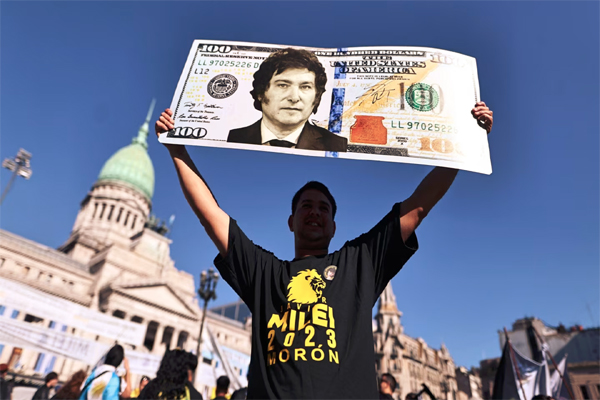
Latin America Daily Briefing
Argentina’s new Milei administration announced deep spending cuts and a sharp devaluation of Argentina’s currency, following through on promises of shock therapy to the country’s inflation-ridden economy.
The new Economy Minister Luis Caputo announced the plan in an 18-minute prerecorded address. “We will be worse off than now for a few months, especially in terms of inflation,” he said. The new measures include a freeze on new infrastructure projects; firing recently hired government workers; reducing energy and transportation subsidies; cut funding to the country’s 23 provinces; and halving the number of federal ministries.
The government said it would offset the impact of cuts on the country’s poor by doubling payments under existing direct subsidy programs.
The government will slash spending equivalent to 2.9% of gross domestic product, in a radical fiscal adjustment, according to Bloomberg.
The package of measures “will increase inflation, will reduce income, will reduce activity and employment and it will increase poverty,” economist Martin Rapetti told the New York Times. “The question is, what is society’s tolerance for these measures?” he added. “The people are the ones who are going to pay.”
Speaking of payment, the IMF, which is owed $43 billion by Argentina, quickly welcomed the package. “These bold initial actions aim to significantly improve public finances in a manner that protects the most vulnerable in society and strengthen the foreign exchange regime,” said the Washington-based lender. (Financial Times)
Since 2019, Argentina’s peso currency has been kept artificially strong by strict capital controls which create a wide gap between the official exchange rate of 366 per dollar and parallel rates as high as 1,000 per dollar, reports Reuters.

Mexico
- Pundits tend to view Mexican President Andrés Manuel López Obrador as a “charming demagogue whose supporters mindlessly follow him, taken in by his populist rhetoric,” argues Viri Ríos in Americas Quarterly. But “to treat AMLO’s popularity as some kind of hollow scam is to miss out on a historically significant moment in Mexico’s young democracy. There is much more going on here. Indeed, AMLO’s government has delivered important domestic policy accomplishments that have favored the poor.”
- “A bill to cut the working day in Mexico by eight hours to 40 hours a week is unlikely to be approved this year, pushing debate on it back into early 2024 when Congress reconvenes,” reports Reuters.
Nicaragua
- The director of the Miss Nicaragua pageant, Karen Celebertti, has announced her retirement from the organization, nine days after police accused her of “conspiracy” and other crimes. (Guardian)
El Salvador
- “Abortion in El Salvador is strictly illegal, and the country has imposed decades-long sentences on women who abort or even miscarry or suffer other obstetric emergencies. As a result, a major focus of Salvadoran feminist organizing has often had to be getting women out of jail,” writes Metzi Rosales Martel in Lux.
Regional Relations
- “Zionism and the Israeli flag are central to the symbolism and commitments of a resurgent new far right in Latin America, just as the Cuban flag was once a potent symbol (and, in Africa in the mid-1970s, a reality) of anti-imperialist revolution,” writes Forrest Hylton in the London Review of Books. “Zionism, strangely enough, is the ideological glue that binds the right together hemispherically as it sets about privatising and exploiting any and all remaining public goods and services, along with Indigenous and peasant lands and ‘natural resources’.”
- Cuban President Miguel Díaz-Canel met with Iranian leaders in Tehran and signed half a dozen cooperation agreements “in another signal that Havana is strengthening its alliance with anti-Western regimes,” reports the Miami Herald.
- Most experts believe Venezuela’s claim of Guyana’s oil-rich Essequibo territory is just posturing, but the Maduro government could well attack its neighbor, argues Charles Lane in the Washington Post.
- Oil giant ExxonMobil says it will keep increasing production in offshore Guyana despite the escalation of a territorial dispute with neighboring Venezuela, reports the Associated Press.
Venezuela
- The families of Venezuelan political prisoners have been disappointed by the lack of progress on releases following the lifting of U.S. sanctions against the Maduro government in October, reports the Washington Post.
Brazil
- At least nine people have been killed in Brazil’s Amazonian state of Para when a discharge of high-voltage electricity sparked a fire in an encampment of landless worker, reports the Associated Press.
Colombia
- “A recent survey published by the Colombian research group Cifras y Conceptos shows that the right is more popular than at any point since 2019, with 33% of respondent identifying themselves with that political camp. The left, on the contrary, is experiencing its lowest period of popularity, with 15% of respondents identifying as such,” reports El País.
Panama
- The recent victory of Panama’s historic anti-mining movement against a concession is “a model for pushing back extractive capitalism,” reports Nacla.
Regional
- Nations at the Dubai COP28 summit adopted a long-awaited damage fund, last week. The agreement marks a significant milestone in supporting countries affected by climate extremes, but critics stress the need for more substantial financial commitments. (See yesterday’s Just Caribbean Updates.)
Culture Corner
- “A new documentary charts the fall from grace of Heberto Padilla, a disillusioned former supporter of Castro, who was forced to make a public ‘self-criticism’” — Guardian.
- Legendary Guatemalan crooner Ricardo Arjona, known for dozens of pop ballads that became international hits over a career that spanned more than 30 years, said he would stop touring, reports the New York Times.
Jordana Timerman / Latin America Daily Briefing
http://latinamericadailybriefing.blogspot
December 13, 2023












